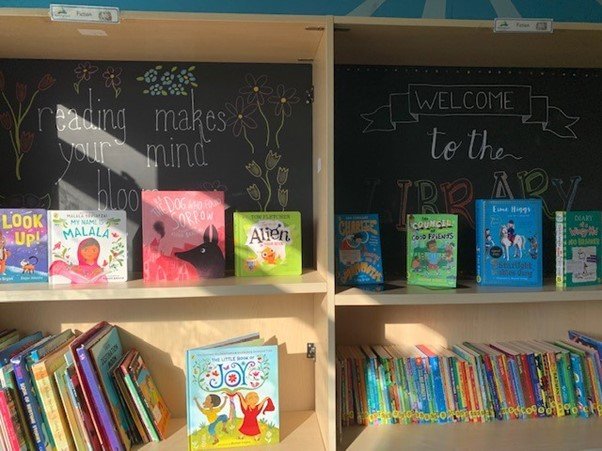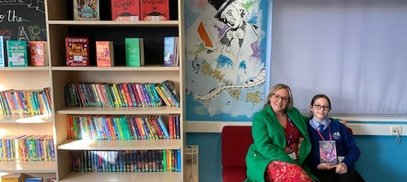School libraries offer children a way to explore their emotions, discover other people’s voices and uncover histories and stories they may otherwise not be able to access. They support reading for pleasure and provide children with an opportunity to fall in love with reading.
However, we find ourselves against a backdrop of the lowest levels of children’s engagement with reading for pleasure, troubling book ownership statistics and the research behind the Libraries for Primaries campaign that state:
- 1 in 7 primary schools in England do not have a library and this rises to 1 in 4 in disadvantaged areas
Our campaign Libraries for Primaries and programme activity is significantly shifting the dial by providing better equipped libraries and more spaces within schools; we even hit a massive milestone when we celebrated our 1,000th library transformation in May 2024.
Hundreds of schools across the UK have participated in Libraries for Primaries programmes and with the support of our resources, accompanying events, and teacher CPD, many primary schools have refreshed their reading spaces into vibrant hubs of creativity and reading for pleasure, embedded a vital culture of reading for pleasure in the school as a whole, and seen a change in their pupils as they have more capacity to grow a generation of readers in their settings.
But don’t just take our word for it!
One primary school in Essex who participated in our Libraries for Primaries programme, World of Stories, last year, has seen a brilliant transformation in their school’s reading for pleasure culture. We asked the assistant principal to share their experiences of taking part in our programme. We wanted to hear how they transformed their reading culture as a result, and what advice they’d give to others setting out on their own school reading journey.
What were the biggest changes or improvements you saw in your library as a result of working alongside the National Literacy Trust?
Environmental and organisational changes within our library has led to greater accessibility. The library is a respected place, and new, relevant texts have given the place a fresh feel.
Through the National Literacy Trust’s in-person training, and the evidence shared during the online learning we decided that we needed to reorganise the way we shelved our books. We had a lot of high shelving units, many of them packed full. This made it hard for children to find books they were interested in, and hard for them to put them back correctly causing the library to look messy, books to be damaged and the children to become disengaged.
Subsequently organising the library in a similar way to local borough libraries, with picture books in kinder boxes and some forward-facing texts, has helped pupils find books that are appropriate and relevant to their interests. We have greater engagement during library sessions and more enthusiastic learners. Our Reading Ambassadors can easily keep the library tidy now too.
What has been the impact on your school’s reading culture?
Taking part in our Libraries for Primaries programme provided an injection of empowerment. Working with the programme not only inspired our leaders and supported how we shaped our direction, but it also filtered through the academy.
We had already begun our reading for enjoyment journey prior to embarking on the programme. However, sharing the research from our Libraries for Primaries programme helped to empower our staff to challenge the children who were perhaps not reading as much as they could. This was possible because the training gave staff the knowledge to identify books that could be ideal for specific children, and equipped them with ways to engage the more reluctant readers in enthusiastic talk about books, characters and plots.
As a result of the programme activity with the National Literacy Trust, we also created book corners, sharing libraries and shared reading spaces around the school. All of these spaces have a sunflower emblem to represent the growth of children as they read.
We created a reading for enjoyment lesson for lower key stage 2 pupils where they share books with friends or the teacher, recommend books to their peers and the teacher also shares their knowledge of great authors, illustrators and texts with the children.
What’s your advice for teachers new to our Libraries for Primaries programmes?
Take time to get to know your school community and what they need from the programme. Think about some of the following questions as a way to evaluate your current need:
- Is it how to develop good quality book talk?
- Is it knowing how to choose a good book?
- Is it developing a better range of books that represents your community?
There are so many things you could focus on from the training, but it is important to do what is right for your setting. Share your vision with all staff at the beginning of your journey and talk to the children regularly to see if your actions are having the impact you wanted.
Undertake pupil voice surveys so you know what’s a priority for your pupils.

Tell us about the resources that were included in the programme
The resources we received as part of the programme including the 400 brand new books to add to our library have been invaluable for our progression as a school and the ability to continue to grow a culture of reading for pleasure. The provision of vital new books allowed us to have enough rotating stock in our library to enable the children to take books home to read, rather than returning them at the end of their library session. This was something that was highlighted as part of our pupil voice surveys at the beginning of the programme, so we knew it was important to our children.
And finally, because everyone loves a good recommendation, what book would you recommend for the library?
I would recommend the ‘Who Was…’ series of books for Years 3 and 4 published by Penguin Random House. They are a great set of books about a range of famous or infamous people, from George Washington to Pele.
How you can get involved or find out more
If you're a teacher or work in a primary school, you can find out more and get involved with our Libraries for Primaries campaign here.
Find tips and guidance on how to start growing and developing your existing library provision with the help of our Library Lifeline blog series
If you’re a business who is interested in finding out how you can fund our work, you can find out more in the Corporate support section of our website.
